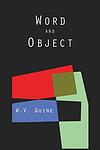Willard Van Orman Quine
Willard Van Orman Quine was a significant American philosopher and logician in the 20th century. He made substantial contributions to various areas of philosophy, including logic, the philosophy of language, and the philosophy of science. Quine's work is known for its systematic approach to philosophy, viewing it as a continuation of science. His most notable ideas include the rejection of the analytic-synthetic distinction, the indeterminacy of translation, and ontological relativity.
Books
This list of books are ONLY the books that have been ranked on the lists that are aggregated on this site. This is not a comprehensive list of all books by this author.
-
1. Word And Object
This philosophical work delves into the nature of meaning and the relationship between language and reality. It challenges the conventional distinction between analytic and synthetic statements and argues against the possibility of a neutral observation language. The author introduces the concept of the indeterminacy of translation, suggesting that there are multiple valid ways to translate words and sentences between languages without a definitive way to determine which translation is correct. Through rigorous analysis, the book explores how our understanding of the world is shaped by the structure of the language we use, ultimately questioning the foundations of semantics and the philosophy of language itself.
The 3451st Greatest Book of All Time -
2. From A Logical Point Of View
This book is a collection of nine essays that delve into the philosophy of logic and the methodology of science. The author critically examines the relationship between language and reality, challenging the distinction between analytic and synthetic statements and advocating for a holistic approach to the empirical content of scientific theories. Through rigorous analysis and argumentation, the work explores foundational questions in epistemology and the philosophy of language, offering insights into the nature of concepts, the structure of scientific theories, and the limitations of our knowledge. The essays collectively argue for a naturalized epistemology, emphasizing the importance of empirical inquiry in understanding the world.
The 4145th Greatest Book of All Time

